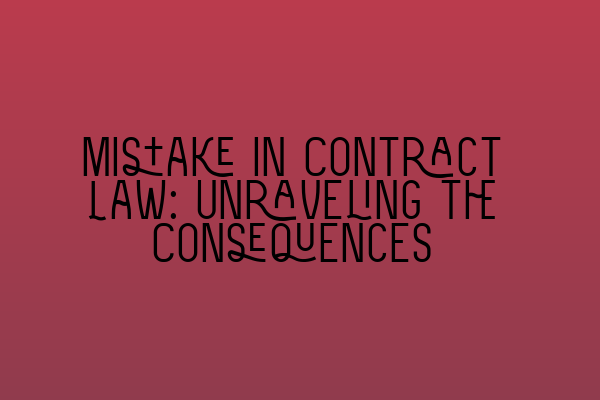Title: Mistake in Contract Law: Unraveling the Consequences
Introduction:
Welcome to SQE Contract Law, where we delve deep into the intricacies of contract law and its practical applications. In this blog post, we will explore the concept of mistake in contract law and its profound implications. Understanding the consequences of mistake is essential for any aspiring solicitor, as it can drastically alter the dynamics of a contractual relationship. So, let’s embark on this enlightening journey together.
An Overview of Mistake in Contract Law:
Mistake in contract law refers to situations where one or both parties enter into a contract under a mistaken belief about a crucial element of the agreement. These elements could include price, identity, subject matter, or even existence. The consequences of such mistakes can vary depending on the nature and type of the mistake.
Types of Mistake:
Broadly speaking, there are three main types of mistake in contract law: common mistake, mutual mistake, and unilateral mistake.
1. Common Mistake:
A common mistake occurs when both parties share the same mistaken belief about a fundamental aspect of the contract. In such cases, the contract may be considered void ab initio (from the beginning), rendering it unenforceable by either party. This principle is reflected in the landmark case of Bell v. Lever Brothers Ltd, which set a precedent for cases involving common mistake.
2. Mutual Mistake:
In contrast to a common mistake, a mutual mistake arises when both parties are mistaken about different aspects of the contract. When a mutual mistake occurs, the contract may be voidable by either party, allowing them to seek rescission of the agreement. The case of Scammell v. Ouston provides a notable example of a mutual mistake leading to contractual rescission.
3. Unilateral Mistake:
An unilateral mistake takes place when only one party is mistaken about a key element of the contract. The consequences of a unilateral mistake can be more complex, as the mistaken party may not always have the option to void or rescind the contract. However, the doctrine of unilateral mistake allows for certain exceptions, such as when the non-mistaken party is aware of the mistake and unfairly exploits it. The legal principle of rectification may also come into play in certain circumstances. The case of Great Peace Shipping Ltd v. Tsavliris Salvage (International) Ltd is a notable example of a unilateral mistake.
Consequences of Mistake:
The consequences of mistake in contract law can be profound, as they can result in the invalidation or alteration of the contractual obligations. It is crucial for solicitors to assess the nature and type of the mistake in order to determine the appropriate legal remedies. Whether it is seeking rescission, rectification, or other remedies, a thorough understanding of the consequences of mistake is essential for successful contract law practice.
Conclusion:
Mistake in contract law is a complex and nuanced concept that warrants careful consideration. As solicitors and legal professionals, it is imperative to navigate the intricate landscape of mistake in order to protect the rights and interests of our clients. By understanding the different types of mistake and their consequences, we can effectively navigate the challenges presented by contract law. For further preparation on SQE exams and to enhance your knowledge of contract law, explore our related articles on SQE 1 Practice Exam Questions, SQE 1 Practice Mocks FLK1 FLK2, SQE 2 Preparation Courses, SQE 1 Preparation Courses, and SRA SQE Exam Dates.
References:
– SQE 1 Practice Exam Questions
– SQE 1 Practice Mocks FLK1 FLK2
– SQE 2 Preparation Courses
– SQE 1 Preparation Courses
– SRA SQE Exam Dates
